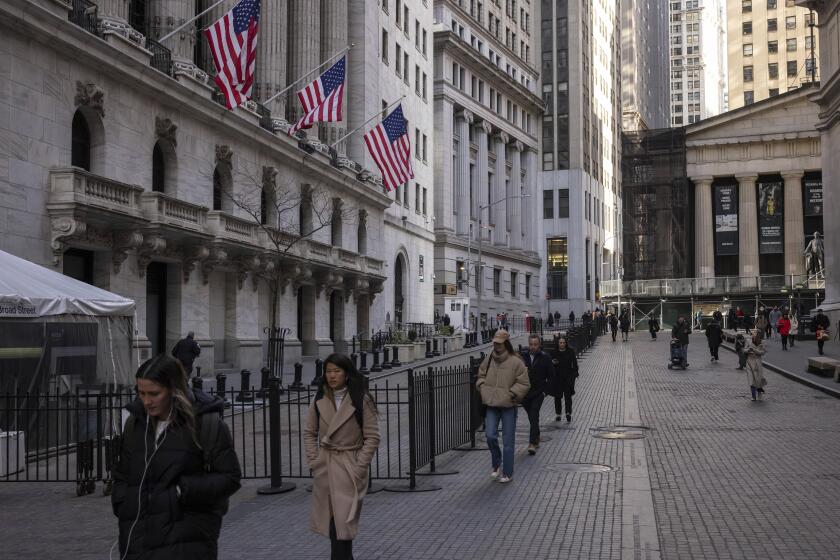STOCKS : Dow Off 78; Program Trading, Oil-Related Selloff Wreak Havoc
Wall Street, in a renewed selloff Tuesday, sent scores of stocks to their lowest prices in more than a year as pessimism soared.
The 30-share Dow Jones industrial average index closed down 78.22 at 2,445.54, a drop of 3.1%. It was the worst fall since a 93-point drop on Aug. 6.
In the broader market, losers outnumbered gainers by more than 4 to 1 in New York Stock Exchange trading, with 1,313 down, 288 up and 388 unchanged. Big Board volume totaled 145.61 million shares, up from 99.47 million shares Monday.
The market was lower for most of the day, and then fell sharply on a frantic bout of selling in the last hour as computer-trading programs kicked in.
“Programs were going absolutely whacko,” one trader said.
Underlying the day’s decline was a sharp rise in oil on Mideast turmoil, raising fears of inflation and widespread skepticism about federal budget talks. Those worries helped send interest rates soaring. (Main story, A1. )
Action in the Senate and House--both of which passed a general budget resolution Monday and left their committees to work out the details--did nothing to calm fears about the economy.
Worries that upcoming third-quarter profit reports will be dismal also added to the slide, particularly after a poor report from Motorola. That stock skidded 7 to 52 3/4 after reporting earnings per share of 78 cents in the third quarter, versus the expected 90 cents to $1 a share.
Also suffering major hits on earnings disappointments were Dow Jones, down 2 5/8 to 20 1/8; Whirlpool, off 2 to 18 5/8; and Consolidated Papers, off 7/8 to 32 1/8. Whirlpool and Consolidated were just two of many stocks hitting new 52-week lows. On the NYSE, 191 stocks hit new 52-week lows, versus 96 on Monday.
Among other market highlights:
* Many recent market leaders fell sharply, raising worries about a new surge in bearishness. ( Market Beat column, D3. )
* Big losers among industrial stocks included Alcoa, down 2 1/8 to 59 3/4; Ford, off 1 3/4 to 31; Caterpillar, off 2 1/4 to 39 3/4, and Grace, down 1 3/4 to 18 7/8.
* Consumer stocks also were dashed, including Gap, down 1 3/8 to 44 1/8; light fixture maker Dynasty Classics, off 2 1/4 to 5 1/4, and General Mills, down 2 3/4 to 80 1/2.
* Sears closed down 1 1/4 at 25 1/4 after a Kidder, Peabody analyst reduced his third-quarter earnings estimate for the retailer.
* After falling 11 1/2 Monday, UAL Corp. dropped 3 1/4 to 88. The company’s board rejected a buyout offer by an employee-led group.
* Travelers, which has been sliding since Friday, when it announced that it would cut its dividend by a third and increase its reserves against real estate losses, dropped another 1 3/8 to 13.
* Countering the general trend, shares of drug maker Upjohn rose 1 to 37 3/4 on vague takeover speculation.
* General Cinema gained 3/4 to 18 1/8 on news that it sold its 17% stake in Cadbury. Neiman Marcus gained 3/4 to 11 7/8 on speculation that General Cinema might now bid for the 40% of Neiman it doesn’t own.
In Tokyo, stocks fell as investors took profits after two sessions of gains. The key Nikkei 225-share index closed down 134.89 at 23,495.11.
In London, share prices fell sharply on concerns that had dogged the London market before sterling’s entry into the European exchange rate mechanism. The Financial Times 100-share index closed down 67.5 at 2,134.1.
Share prices fell sharply in West Germany, with the the 30-share DAX index dropping 32.12, or 2.2%, to 1,433.41.
CREDIT: Bond Traders Buried in Worry; Prices Fall Bond prices also plunged on the soaring price of oil and increasing investor pessimism about interest rates and the ability of Congress to pass a meaningful budget agreement. There was also concern about an oversupply of government bonds, with two auctions planned this week and the Treasury’s quarterly refunding sale next month.
The Treasury’s benchmark 30-year bond dropped 1-25/32, or about $17.81 per $1,000 in face amount. Its yield soared to 8.96% from 8.81% late Monday.
The federal funds rate, the interest banks charge one another on overnight loans, was quoted at 8.063%, up from 7.938% late Friday. The fed funds rate from Monday wasn’t available because of the Columbus Day holiday.
CURRENCY: Foreign Money Sales Ease Dollar’s Drop The dollar finished mostly lower on world markets, but selloffs in other currencies prevented its decline from deepening.
The dollar fell sharply in Asian dealings, hitting new lows against the German mark and 18-month lows against the Japanese yen before consolidating and recovering slightly when trading shifted to Europe and the United States, said Marc Chandler, an analyst with the consulting firm IDEA.
Traders cashed in on the weekend run-up in the British pound and the yen, and their profit taking prevented the dollar from relinquishing further ground.
In Tokyo, the dollar fell 0.10 yen to a closing 129.95 yen. Later in London, it was quoted higher at 130.30 yen. In New York, the dollar settled at 130.25 yen, down from 130.48 yen on Monday.
The British pound, which soared Monday after its official entry into the European exchange rate mechanism, closed at $1.973, down slightly from Monday’s $1.976.
Against the German mark, the dollar closed at 1.523, down from Monday’s 1.531.
COMMODITIES: Rumors of Soviet Sale Undercuts Gold Gold prices declined sharply on New York’s Commodity Exchange amid fears of a massive Soviet gold selloff, analysts said.
On other commodity markets, grains and soybeans were mixed, and meat and livestock futures were slightly higher.
Gold settled $4.80 to $5.30 lower, with the contract for delivery in October at $389.70 an ounce. Silver settled 7.7 to 8.5 cents lower, with October at $4.59 an ounce.
Prices of precious metals futures, which usually follow the energy futures market, plummeted after traders began selling off on rumors that the cash-strapped Soviet Union is expected to sell off a good quantity of its gold supply to finance recent purchases of grains and other goods.






